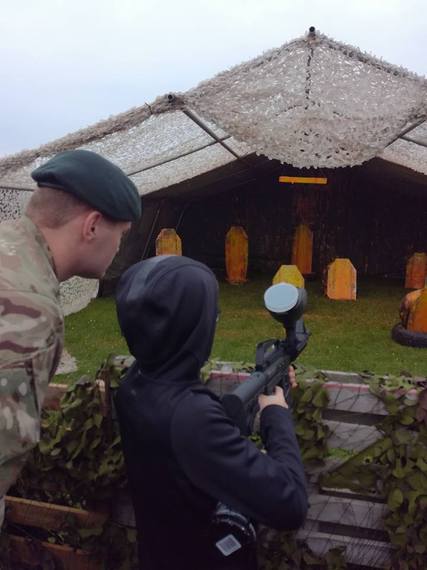By Rhianna Louise, September 22, 2017, Huffington Post.
This week 17 former Army Foundation College Harrogate instructors face a court martial. They are charged with mistreating recruits – including actual bodily harm and battery.
They are alleged to have kicked or punched the recruits during infantry training and smeared their faces with sheep and cow dung.
This is the Army’s largest ever abuse case and centres on the main training establishment for recruits under 18.
Among the many questions that must be answered, those examining the AFC Harrogate case should query the wider issue of causality: do military environments by nature facilitate threats to child welfare?
There are two military environments for children in the UK – military training for 16-18-year-olds, and the cadet forces.
While many benefit from and enjoy their time in the cadets and in military training, others suffer in the long and short-term as a result of behaviours that can be directly associated with key attributes of military environments.
The statistics suggest that abuse is widespread in the armed forces. The most recent survey of armed forces personnel shows that 13% experienced bullying, harassment or discrimination in the last year.
However, only one in 10 made a formal complaint with the majority not believing anything would be done (59%), because it might adversely affect their career (52%), or because of worry about recriminations from the perpetrators (32%). Of those that did complain, most were dissatisfied with the outcome (59%). A report by the MoD in 2015 found high levels of sexual harassment in the Army with females and junior soldiers most at risk.
Young people in the cadet forces have also been the subject of abuse.
In July, Panorama revealed evidence from a seven-month investigation, showing that in the last five years 363 sexual abuse allegations – both historical and current – have been made for the cadet forces.
The research shows a pattern of abuse being covered up, with victims and parents silenced, and perpetrators left unprosecuted and in a position of power and access to children.
Veterans for Peace UK have recently published The First Ambush, a report that evidences how military training and culture affect soldiers, in particular those who enlist at a younger age and who come from disadvantaged backgrounds.

These changes are then reinforced by traumatic war experiences: ‘Veterans for Peace UK has pointed to the ‘brutalising’ nature of army training… Perhaps counter-intuitively, veterans often argue that their military training contribute as much to later difficulties, or indeed more so, than exposure to traumatic events in war.’
Aside from bullying and abuse, research shows that enlisting into the military at a young age is also questionable in terms of fully informed consent, and endangers long-term health and social mobility – carrying risks that are far reduced among older recruits.
Commodore Paul Branscombe, who managed a major military welfare service after a navy career of 33 years, writes:
At [age 16] recruits are not emotionally, psychologically or physically mature enough to withstand the demands placed upon them… Many of the welfare issues I have encountered among armed forces personnel, during and after service, have been related to enlisting too young, not just in terms of the immediate impact on individuals, but also in the transmitted effect upon families which can continue long after service ceases.
If aggression, violence and learning to just ‘deal’ with it, are an integral part of military training, there should be far more rigorous safeguards in place to protect young people in military environments.
While the safeguarding systems for young recruits and cadets have clearly not been up to the job, the evidence is mounting that a military environment, particularly a full time one, is not in any case an appropriate place for the young and vulnerable.
The many calls for a review of the age of enlistment to the UK armed forces, from the United Nations, parliamentary committees and child rights organisations, have been unheeded by a military establishment concerned to stem a recruitment shortfall and draw young people in before they are lost to other careers.
This needs to change; the interests and welfare of young people must be prioritised above the interests and demands of the armed forces. Raising the age of recruitment to 18 would provide the best safeguard against abuses faced by the youngest recruits.








